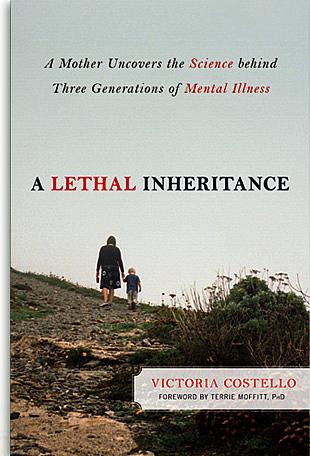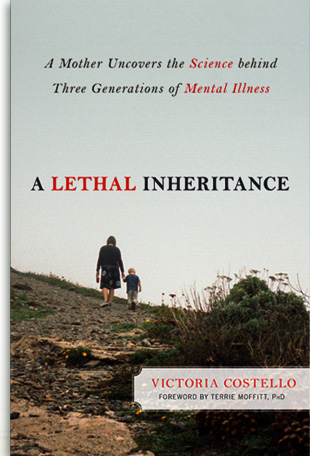Writing "A Lethal Inheritance": Finding the Right Balance Between Fact and Feeling

Victoria Costello's book, "A Lethal Inheritance: A Mother Uncovers the Science Behind Three Generations of Mental Illness," will be published by Prometheus Books in January 2012. You can find out more about Victoria and her book at her website and on her ReportingonHealth member profile page.
 I began this book project with the premise that the world didn't need another memoir of mental illness - unless I could find a novel and useful reason for sharing the intimate details of what had been the worst decade of my life.
I began this book project with the premise that the world didn't need another memoir of mental illness - unless I could find a novel and useful reason for sharing the intimate details of what had been the worst decade of my life.
After dealing in 1998 with the diagnosis of my eldest son Alex at age seventeen with paranoid schizophrenia, I then confronted my own lifelong depression followed rapidly by my youngest son's depression and anxiety disorder - while navigating the emotional and practical fallout.
Nothing prepares you for such an unraveling - particularly when you come from a family steeped in denial, addiction, and hidden mental illness, as mine was. Eventually I would see that these historical family dysfunctions and secrets were as central to the story I had to tell as were the present-day diagnoses, and treatment decisions I was encountering.
Journals I'd kept over a lifetime proved particularly useful when I was challenged to sort out a timeline for the memoir sections I used to frame my reporting on the science of mental illness in A Lethal Inheritance. Once I'd achieved a modicum of distance-essential for writing a story like this-I saw that I had in hand a "real-time" documentation of the progression of psychological symptoms in each of us that I could then compare to the startlingly similar data coming from long-term family mental health studies. This is how I came to the decision to use my own family going back three generations as a case study on how mental illness and addiction traverse families. But actually figuring out how that would work took several more years. First, I would have to reach personal recovery, as I write in the book:
Well-meaning family and friends were sympathetic but clearly pessimistic about Alex's chances of recovery. One recommended Alex "learn a trade," so he might remain independent. Others spoke as if my son was already dead, suggesting I allow myself to "mourn his loss."
As it turned out, my most important asset at this time - beyond the false sense of control I'd acquired as the adult child of a long line of alcoholics-was my professional training as a science journalist. Although I was more comfortable dealing with environmental subject matter than psychiatry or neuroscience, I at least knew how to read a scientific report. I quickly moved my search for answers to the national mental health databases and professional journals. Since I was also a working single mother, these research efforts had to be squeezed into early mornings and late nights while I spent the better part of each day working as a freelancer writing TV scripts for Hollywood production companies, assigned to cooking and gardening shows for cable channels, and the occasional nature special for Disney. Many days, I felt like I was leaving a disaster movie unfolding in slow motion at home to escape for a few hours of fun at Disneyland, famously pegged as "the happiest place on earth."
By 2008, after my sons and I had banked a few years each of emotional stability and I had the time and energy to immerse in writing, I encountered another challenge that nearly convinced me to abandon the project: the scarcity of literary models for the type of hybrid book I wanted to write. One typically found mostly memoir with a smattering of science or a scientific account of a medical mystery with a few sentences of personal experience to frame the author's intention.
[video:http://www.youtube.com/watch?v=1MSdeHlf-YI]
Certainly there was Andrew Solomon's A Noonday Demon, An Atlas of Depression, the first book I knew to successfully plumb the depths of the experience and science of mental illness. I also found parallels in Joan Didion's The Year of Magical Thinking in which she seamlessly glided between equally compelling moments of personal despair and analytical observations on death and grief.
Somehow, though, my story felt messier than either of these masterworks. The structure I was using felt wholly inadequate - with chapters seemingly lurching between intimate memoir and impersonal science in a manner that felt disjointed and clumsy. I put my first draft back in storage for another year while keeping an eye on the science of mental illness that I'd begun tracking out of personal necessity and now followed with something closer to obsession.
Ultimately, it was by tracking developments in multiple research areas that I figured out how to structure this book. It seems I'd been missing more than a literary model. I needed a critical mass of scientific research to explain how genetically conferred risks for mental illness such as those carried by my sons and I could have been triggered or mitigated by the good and bad experiences that had marked my paternal line since my ancestors arrived as immigrants on these shores more than a century ago. Ultimately this research would include family studies along with new findings from psychiatric epidemiology, genetics, neuroimaging, and a decade of clinical trials using early interventions for signs of psychosis in young people whose symptomatic trajectories were identical to those Alex experienced at seventeen.
My structure then fell into place beginning with the reason for my initial need to know-Alex's mental unraveling on the streets of Los Angeles in the late 1990s with his subsequent diagnosis of schizophrenia. I then turned the narrative back in time through my childhood and the brief tragic lives of my sister and father to an Irish immigrant grandfather whose "accidental" death at twenty-eight proved to be a likely suicide and a marker for the three generations of addiction, depression and psychosis that would follow. Each chapter in A Lethal Inheritance includes pieces of memoir covering one of these family members' stories interwoven with scientific research to shed light on their shattered lives; findings on why people die by suicide, how the theory of self-medication became accepted medicine, and what we now know about the links between different mental disorders and addictions that typically reoccur in patterns within families. The final act of the story I tell, the third of its three parts, then became a prescriptive message. From the book:
I've learned three important lessons on my journey through mental illness. First, that I've done things in the wrong order. If we, as parents, get treatment for our own psychological or addiction issues, our children will suffer far less mental illness. If they're already struggling with a mental health challenge, we'll be of much greater help to them. That leads to my second discovery: intervening sooner for a mental health problem is better than picking up the pieces later - for everyone. Lastly, I've learned that although we're each born with inherited liabilities and assets, throughout our lives, our minds become largely what we make of them. Put simply, nurture can trump nature. In some cases, it can even turn an inherited liability into a possibility - yes, an asset. Once we get these three things, the game has changed, and we're living in the prevention model of mental wellness where healthy minds rule.
A final note concerns the publishing of this book. My agents, Michael Carlisle and Charlie Olson of Inkwell Management, reported back to me that many editors to whom they offered my proposal and first three chapters were unnerved by my mixing of heated intimate memoir with cool reporting on the latest brain discoveries. It stayed on offer for four months until we found someone who, it turned out, had already stepped into this literary territory. Linda Greenspan Regan, editor in chief at Prometheus Books, had done well with another comparable book, Evil Genes, Why Rome Fell, Hitler Rose, Enron Failed and My Sister Stole My Mother's Boyfriend by Barbara Oakley. I think it helped that Prometheus had a reputation of publishing solid science and psychology books, giving them the confidence to take chances with newer approaches to science topics.
To read an excerpt: http://alethalinheritance.com/about-the-book/excerpt/
Victoria Costello is an Emmy Award-winning science writer with five previously published co-authored books in psychology who blogs on PsychologyToday.com. A Lethal Inheritance, A Mother Uncovers the Science Behind Three Generations of Mental Illness releases January 24, 2012 from Prometheus Books, and will be excerpted in the March issue of Scientific American Mind.

